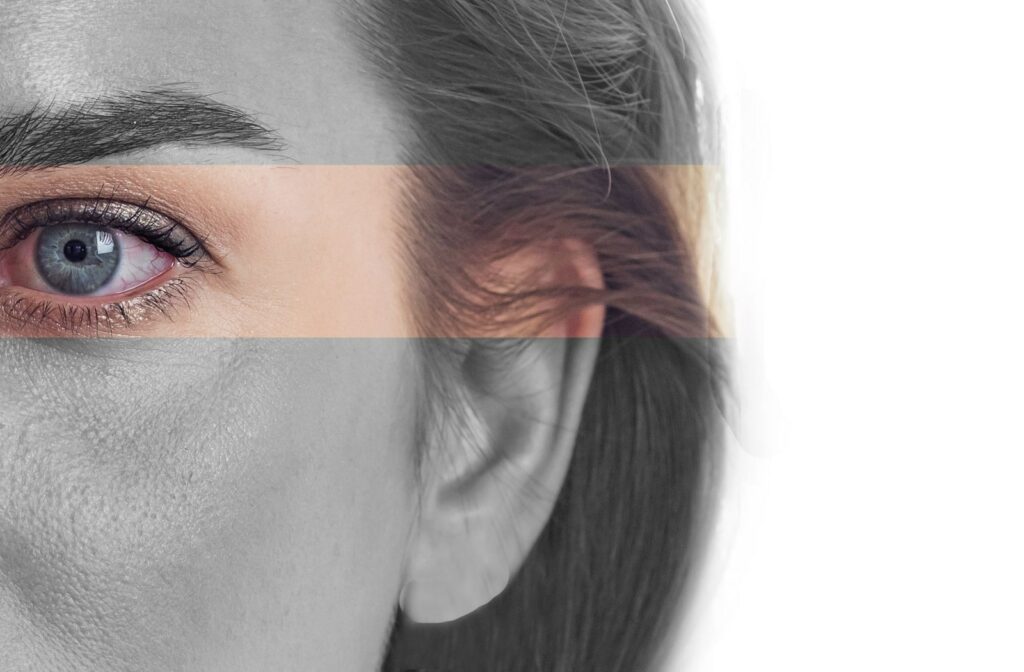Dry eyes can disrupt work and school, make screen time miserable, and make wearing contact lenses feel impossible—and dysfunction in your meibomian glands can be the cause.
You might have heard of these glands that secrete natural oils to keep your eyes lubricated. When they become clogged, it can cause discomfort and even lead to more severe conditions. But you can manage blocked meibomian glands to reduce the effects of dry eyes with warm compresses, eye masks, eyelid cleansers, and in-office dry eye treatments.
A comprehensive eye exam is a crucial first step in identifying meibomian gland dysfunction, ruling out other causes of discomfort, and implementing lasting treatments to relieve your dry eyes.
What Are Meibomian Glands?
Meibomian glands are tiny glands in your eyelids that secrete oil, which is essential for keeping your eyes lubricated and healthy. These oils help prevent tear evaporation and dry eyes. The secretion of these oils is facilitated by blinking, which pushes the oils onto the surface of your eyes.
When these glands are clogged, you can develop a condition called meibomian gland dysfunction (MGD), a leading cause of dry eye disease.
Symptoms of Meibomian Gland Dysfunction & Dry Eyes
People with MGD often experience dry eye symptoms, such as a gritty, burning, or foreign body sensation in the eyes.
The symptoms of dry eye vary from person to person, but some of the most common symptoms include:
- Burning sensations in the eyes
- Redness and inflammation
- Sensitivity to light
- Blurred vision
- Tired eyes
- Difficulty wearing contact lenses
- Watery or teary eyes
MGD can also cause inflammation of the eyelids, or blepharitis, leading to redness and swelling. If left untreated, MGD can lead to more severe eye problems like corneal ulcers and infections.
Well-balanced tears are crucial for maintaining your eye’s health and lubrication. They help to keep your eyes moist and prevent infections. When your eyes are not properly lubricated, you may experience discomfort and irritation—and even changes to your vision.
Why Do Meibomian Glands Get Clogged?
There is still no definitive answer as to why meibomian glands get clogged. However, several risk factors are associated with this condition, such as hormonal changes, other medical conditions, and aging.
There are also other factors that can contribute to dry eye and affect the quality of your meibomian glands’ oil, leading to blockages. These include:
- Certain medical conditions, such as rheumatoid arthritis, lupus, and diabetes
- Medications like antihistamines and decongestants
- Environmental factors, such as windy and dry climates, air conditioning, and smoke
What Are the Treatment Options for Clogged Meibomian Glands?
Warm Compresses
Warm compresses and gentle massages can help melt meibomian gland blockages and encourage the smooth flow of oil. The heat from a warm compress helps to soften and liquefy the oil, making it easier to express.
Eye masks can apply targeted warmth to the eyelids, and you can try a mask in-office before continuing the treatment at home.
In order to effectively use a mask or warm compress, apply the warm compress to your eyes 2–4 times a day, followed by a gentle massage on the eyelids to help express the oil.
Eyelid Cleansers
Another effective treatment option is to use eyelid cleansing wipes to remove excess oils, bacteria, and dead skin cells that may be contributing to clogged glands. We can recommend and provide cleansing wipes to help improve your MGD at home without irritating sensitive skin.
In-Office Dry Eye Therapy
Your optometrist may recommend other in-office procedures to clear the blockages. Many of these procedures can help unblock meibomian glands and restore natural oil flow.
Preventing Meibomian Gland Dysfunction
Good eye hygiene and managing medical conditions such as blepharitis and rosacea are essential for preventing clogged meibomian glands. Fortunately, there are ways to manage dry eyes to help keep your eyes healthy.
Treatment plans for dry eye often depend on the severity of your symptoms. During your visit, we can help you find the right at-home solutions for managing dry eyes and MGD.
Some of the strategies we recommend for managing dry eyes and preventing MGD include the following:
- Use artificial tears
- Use a humidifier
- Adjust your environment to avoid environmental irritants
- Try to blink more often when using a computer
- Follow the 20-20-20 rule during screen time
- Practice healthy eyelid hygiene habits
Don’t Suffer Through Dry Eye Symptoms
Meibomian gland dysfunction and dry eye are prevalent conditions that can be frustrating. Fortunately, there are several effective ways to treat and prevent them. Whether it’s simple at-home remedies like warm compresses or in-office procedures, there are options available to help restore gland function and reduce the effects of dry eye disease.
Taking proper care of your eyes to prevent dry eye and keep them healthy is essential, and you don’t have to suffer in silence. Our eye care team at Eye Effects can help diagnose meibomian gland dysfunction and provide the right treatment plan for you.
When your eyes are feeling healthy and nourished, your quality of life can improve. Book an appointment with us to get started on your path to dry eye relief.


